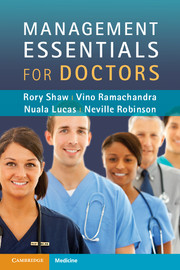Book contents
- Frontmatter
- Contents
- Contributors
- Foreword
- Preface
- Acknowledgements
- Section 1 Core knowledge
- Section 2 Core skills
- Section 3 Important bodies
- Section 4 Information, evidence and research
- Section 5 Money
- Section 6 NHS structures
- Section 7 Operations
- Section 8 Safety and quality
- Section 9 Staff issues
- Chapter 50 Managing staff
- Chapter 51 Employing new staff to the organization and starting work
- Chapter 52 Managing normal working
- Chapter 53 Job planning
- Chapter 54 Appraisals
- Chapter 55 Revalidation
- Chapter 56 Managing poor performance
- Chapter 57 Managing other problems
- Chapter 58 Measuring how well we manage staff
- Chapter 59 Managing stress
- Chapter 60 The sick doctor
- Index
- References
Chapter 59 - Managing stress
Published online by Cambridge University Press: 05 March 2012
- Frontmatter
- Contents
- Contributors
- Foreword
- Preface
- Acknowledgements
- Section 1 Core knowledge
- Section 2 Core skills
- Section 3 Important bodies
- Section 4 Information, evidence and research
- Section 5 Money
- Section 6 NHS structures
- Section 7 Operations
- Section 8 Safety and quality
- Section 9 Staff issues
- Chapter 50 Managing staff
- Chapter 51 Employing new staff to the organization and starting work
- Chapter 52 Managing normal working
- Chapter 53 Job planning
- Chapter 54 Appraisals
- Chapter 55 Revalidation
- Chapter 56 Managing poor performance
- Chapter 57 Managing other problems
- Chapter 58 Measuring how well we manage staff
- Chapter 59 Managing stress
- Chapter 60 The sick doctor
- Index
- References
Summary
Stress is the adverse reaction people have to excessive pressures or other types of demand placed on them. There is a clear distinction between pressure, which can create a ‘buzz’ and be a motivating factor, and stress, which can occur when this pressure becomes excessive. It is inevitable that events both in personal and professional life will prove stressful. Moderate amounts of stress provide the driving force for humankind to function optimally. Undue stress, however, is eventually unsustainable and may in extreme situations result in mental or physical disintegration.
Work-related stress is a major cause of occupational ill health. The costs to society have been estimated by the Health and Safety Executive to be around £4 billion each year. Work-related stress has adverse effects on organizations in terms of:
Employee commitment to work
Staff performance and productivity
Accidents caused by human error
Staff turnover
Attendance levels
Staff recruitment and retention
Organizational image and reputation.
- Type
- Chapter
- Information
- Management Essentials for Doctors , pp. 186 - 188Publisher: Cambridge University PressPrint publication year: 2011



